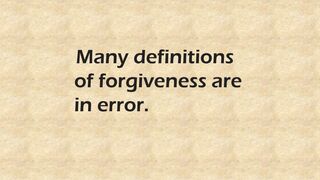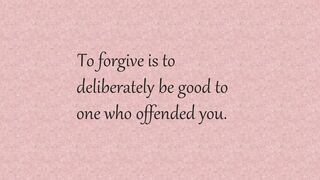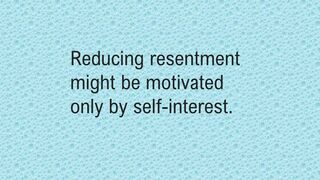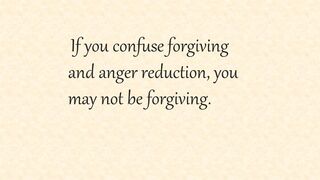Forgiveness
How Forgiving a Person and Transcending Your Anger Differ
Is forgiveness rising above your negative emotions or is it more challenging?
Posted October 18, 2022 Reviewed by Abigail Fagan
Key points
- There is an emerging consensus that forgiveness only involves reducing your anger toward the situation or toward the one who hurt you.
- Forgiving and reducing anger cannot be the same because, as a moral virtue, forgiveness involves a focus on goodness toward the offending person.
- There are dangers in confusing the moral virtue of forgiveness with transcending anger.

As forgiveness becomes more and more popular both in the mental health professions and in regular society, it is becoming obvious that there are many divergent ideas emerging regarding what forgiveness is and is not. I recently read an article in which the author started the essay by defining forgiving as the release of deep anger. In fact, there is a consensus building that forgiveness amounts to getting rid of a negative emotion such as anger and resentment. I did a Google search using only the word “forgiveness.” I found the following definitions of what the authors reported forgiveness to be:
Forgiveness (supposedly) is:
- Letting go of resentment and thoughts of revenge;
- The release of resentment or anger;
- A conscious and deliberate decision to release feelings of resentment or vengeance toward a person who acted unjustly;
- Letting go of anger;
- Letting go of negative feelings such as vengefulness;
- Transcending negative emotions by rising above them;
- Substituting more pleasurable activities so that the anger is overcome.
Forgiveness as a Moral Virtue

I think you get the idea. The consensus is that forgiveness focuses on getting rid of persistent and deep anger. Synonyms for this are resentment and vengefulness. Readers not deeply familiar with the philosophy of forgiveness may simply accept this as true. Yet, this attempted and consensual definition cannot possibly be true if forgiveness is a moral virtue, as are justice and patience and kindness, for example. Forgiveness does seem to be a moral virtue because it shares, with the other moral virtues, the distinct commonality of goodness toward others. To forgive involves goodness toward those who are not good to you (see, for example, Enright & Fitzgibbons, 2015). The highest form of this goodness is love toward the one who offended (Enright, 2012). A forgiver need not reach this highest level to be forgiving well. As Lewis Smedes (1984) reminds us, we are all imperfect forgivers.
Why Forgiving and Transcending Anger Are Not the Same

If, in fact, forgiveness is a moral virtue, then it cannot possibly be only the transcending of negative emotions for the following reasons:
A person can reduce resentment and still dismiss the other person as not worth one’s time.
Reducing resentment itself is not a moral virtue. This might happen because the “forgiver” wants to be happy and so there is no goodness toward the other, which is part of the definition of a moral virtue.
There is no specific difference between forgiveness and tolerance. I can get rid of resentment by trying to tolerate the other. Putting up with the other as a person is not a moral virtue.
As we transcend the negative emotions, we can do so without the one who offended being part of this activity.
Forgiveness, if we take these definitions seriously, is devoid of love. It is not that one has to resist love as one strives to reduce anger. Yet, one can be completely unaware of love as the essence of forgiveness while holding to the consensual definition.
A central goal of forgiveness is lost. Off the radar by the consensual definition is the motivation to assist the other to grow as a person. After all, why even bother with the other if I can finally rid myself of annoying resentment?
Equating Forgiving With Anger Reduction and Transcendence May Be Dangerous

We need to make an important distinction between forgiveness and transcendence. Transcendence, in the case of being treated unfairly by others, is valuable in that one deliberately cultivates a more disconnected sense of the unjust situation and the accompanying anger. One tries to rise above the injustice by not caring so deeply about what happened, thus reducing the negative reaction of anger or even hatred toward those who acted unfairly. This kind of activity is valuable because it shows the offended person that too much caring about being offended can do more damage to the self than to the other who offended. At the same time, we need to see that to forgive is not the same thing as to transcend both the unjust situation and the offending person, as we discussed above. If we do not make this distinction, it could be dangerous.
The statements “forgiveness is ridding the self of resentment or vengefulness” or “I can transcend my anger,” if seen as forgiveness itself, is reductionistic and therefore potentially dangerous. It is dangerous in a philosophical and a psychological sense. The philosophical danger is in never going deeply enough to understand the beauty of forgiveness in its essence as a moral virtue of trying to offer goodness (even love on the highest level of forgiving) to those who did not love you. The psychological danger is that Forgiveness Therapy will be incomplete as the client keeps the focus on the self, trying to rid the self of negatives. Yet, the paradox of Forgiveness Therapy is stepping outside of the self, to reach out to the other, and in this giving is psychological healing for the client. It is time to challenge the consensus.
References
Enright, R.D. (2012). The forgiving life. Washington, DC: APA Life Tools.
Enright, R.D. & Fitzgibbons, R. (2015). Forgiveness therapy. Washington, DC: APA Books.
Smedes, L. (19840. Forgive and forget. San Francisco: HarperOne.


